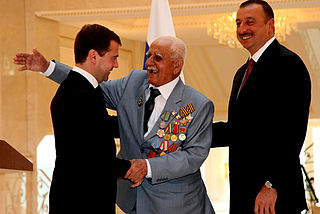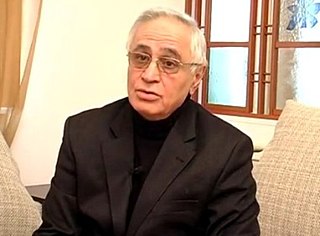
The Politics of Azerbaijan takes place in a framework of a semi-presidential republic, with the President of Azerbaijan as the head of state, and the Prime Minister of Azerbaijan as head of government. Executive power is exercised by the president and the government. Legislative power is vested in both the government and parliament. The Judiciary is nominally independent of the executive and the legislature. The state system of Azerbaijan defines the Constitution of the Republic of Azerbaijan. According to the constitution, Azerbaijan is a democratic, secular, unitary republic.

Heydar Alirza oglu Aliyev was an Azerbaijani politician who served as the third President of Azerbaijan from October 1993 to October 2003. As national president he held constitutional powers, but his influence on Azerbaijani politics had begun years earlier. As a young man he had joined the Azerbaijan SSR People's Commissariat for State Security (NKGB) and quickly rose to the rank of Major-General.

The Azerbaijani Popular Front Party (APFP) is an opposition political party in Azerbaijan, founded in 1992 by Abulfaz Elchibey. After Elchibey's death in 2000, the party split into two factions, the reform wing led by Ali Kerimli and the classical wing led by Mirmahmud Miralioglu.

Ali Karimli born Ali Amirhuseyn oglu Karimov is an Azeri politician and the head of the reformist wing of the Azerbaijan Popular Front Party (APFP).

Azerbaijan–Russia relations defines the relationship between the two countries, the Republic of Azerbaijan and the Russian Federation.
Surat Davud oglu Huseynov is an Azerbaijani colonel and ex-Prime Minister of Azerbaijan, who rose to prominence during the Nagorno-Karabakh War. His military career led, in 1993, to his rise to Prime Minister and later prison term.

Kələki is a village and municipality in the Ordubad Rayon of Nakhchivan, Azerbaijan. It is located on the Ordubad-Unus highway, 45 km in the north-east from the district center. People of the village is busy with gardening, vegetable-growing, animal husbandry. There are secondary school, club, library and a medical center in the village. It has a population of 463.

Presidential elections were held in Azerbaijan on 7 June 1992, the first in more than seventy years not held under communist control. Five candidates were on the ballot, seeking election to a five-year term. The election featured the unprecedented use of television, posters, and other media by multiple candidates to communicate platforms and solicit votes.

Rahim Hasan oglu Gaziyev was Azerbaijani Defense Minister in 1992–1993, in the turmoil of the Nagorno-Karabakh War, and later a political prisoner.
The Alley of Honor is a public cemetery and memorial in Baku, Azerbaijan. The Alley includes burials of famed Azerbaijanis and Azerbaijan-affiliated expatriates, including several Presidents, scientists and artists. There are 242 burials in total.
Whole Azerbaijan is an irredentist concept of uniting Azerbaijani-inhabited territories into Azerbaijan.
Dadash Rzayev Garib oglu was Minister of Defense of Azerbaijan from February to June 1993 and is currently the Chairman of Confederation of Azerbaijani Officers in Reserve. His active service in the army lasted for 40 years, 37 of which were in the Airborne Troops.

Major General Nuraddin Sadigov Sadig oglu also known as Nuraddin Sadikhov, was the Chief of General Staff of Azerbaijani Armed Forces, Deputy Minister of Defense of Azerbaijan Republic and National Advisor on Military Issues.
Shah Ismail Order, is the highest Azerbaijani military award presented by the Commander-in-chief and President of the Republic of Azerbaijan.
Eldar Namazov Sagif oglu is a politician from Azerbaijan. He served as the head of the Presidential Administration of Azerbaijan Republic and the Presidential aide to Heydar Aliyev.

The Qizil Ulduz Medal is an award that honors a National Hero of Azerbaijan.
The 1993 Azeri coup d'état took place on 1 September 1993 by militia led by military commander Surat Huseynov. While the Azerbaijan lost the war which opposed it to the Armenia, president Abulfaz Elchibey sent the Commander Surat Huseynov due to its military failures. It thereby created a hostile militia to the Government, precipitating the defeat of the Azerbaijan. Therefore, on September 1, his militia took the capital, Baku, forcing president Abulfaz Elchibey to flee.
A constitutional referendum was held in Azerbaijan on 26 September 2016. Voters were asked whether they approve of 29 constitutional amendments, with a separate vote on each one. All 29 amendments were approved by between 89% and 95% of voters. It created the office of the Vice President and extended the presidential term from five to seven years.

A constitutional referendum was held in the unrecognised Nagorno-Karabakh Republic on 20 February 2017. At least 25% of registered voters needed to vote in favour in order to validate the result. The referendum passed with about three quarters of voters voting.













